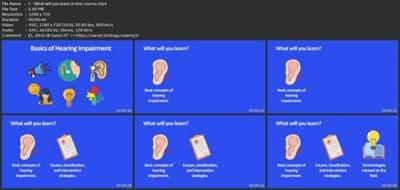
Basics Of Hearing Impairment
Posted on 25 Sep 08:15 | by oaxino | 0 views

Basics Of Hearing Impairment
Published 9/2023
MP4 | Video: h264, 1280x720 | Audio: AAC, 44.1 KHz
Language: English | Size: 1.12 GB | Duration: 2h 57m
A comprehensive guide to the classification, risk factors, preventive strategies and terms relevant to hearing loss.
Published 9/2023
MP4 | Video: h264, 1280x720 | Audio: AAC, 44.1 KHz
Language: English | Size: 1.12 GB | Duration: 2h 57m
A comprehensive guide to the classification, risk factors, preventive strategies and terms relevant to hearing loss.
What you'll learn
Basic knowledge of hearing impairment, basic anatomy of the human ear and process of human hearing.
Intervention and preventive strategies to minimize the adverse affects of hearing loss.
Knowledge regarding various terminologies related to special education, disability, hearing impairment and rehabilitation field.
Types of hearing loss: how can hearing loss by explained and categorized.
Requirements
No prior experience needed.
Fresh school graduates can also attend this course.
Anyone who has an interest in the field can attend this course.
Description
In this course you will learn about the basic anatomy of the human ear, what impairment and disability mean, the high-risk factors for hearing loss, types of hearing loss, strategies to avoid the adverse effects of hearing loss, and the various terms that are relevant to the field of hearing impairment, special education, and rehabilitation.This course is suitable for individuals interested in the field of special education, new and aspiring parents and guardians, individuals interested in the hearing rehabilitation field, and individuals looking to gain preliminary knowledge about hearing loss.This course is divided into 6 sections and at the end of every section there will be a simple Q and A. In the first section Introduction to Hearing Impairment, you'll learn about the following terms: ICF, impairment, disability, handicap, activity limitation, participation restrictions, anatomy of the human ear and process of human hearing, Deaf with uppercase D, and deaf with lowercase d.In the second section Classification of Hearing Impairment, you will about the different types of hearing loss and how it can be classified. You will also be learning important terminologies.Hearing loss has often been called an invisible disability. There is nothing visible that identifies someone with hearing loss, or signals that they need treatment. Hence it is easy for hearing loss to go unnoticed.
Overview
Section 1: Introduction to hearing impairment.
Lecture 1 What will you learn in this course?
Lecture 2 Who will benefit from this course?
Lecture 3 What is the course layout?
Lecture 4 Section 1 layout: Introduction to hearing impairment.
Lecture 5 What is ICF?
Lecture 6 What does Impairment mean?
Lecture 7 What does Disability mean?
Lecture 8 What does Handicap mean?
Lecture 9 Difference and Interrelation: Impairment, Disability and Handicap.
Lecture 10 Components of ICF: Functioning and Disability.
Lecture 11 Components of ICF: Contextual Factors.
Lecture 12 Interaction between Functioning and Disability and Contextual Factors.
Lecture 13 Basic Anatomy of the Human Ear.
Lecture 14 Process of Human hearing.
Lecture 15 Difference between 'D'eaf and 'd'eaf.
Section 2: Classification of hearing impairment.
Lecture 16 Section 2 layout: How can hearing impairment/loss be categorized?
Lecture 17 Hearing loss categorized based on 'Degree'.
Lecture 18 Difference between 'Deaf' and 'Hard of Hearing'.
Lecture 19 What does 'Residual Hearing' mean?
Lecture 20 Hearing loss categorized based on 'Site of Lesion'.
Lecture 21 Site of Lesion: Conductive hearing loss: Ear malformations and ear wax blockage.
Lecture 22 Conductive hearing loss: Foreign bodies, hole in eardrum and ossicular chain.
Lecture 23 Conductive hearing loss: Middle ear problems and benign tumors.
Lecture 24 Site of Lesion: Sensorineural hearing loss: Malformations, age, noise induced.
Lecture 25 Sensorineural hearing loss: Drugs, explosions and trauma, meningitis, diabetes.
Lecture 26 Site of Lesion: Mixed hearing loss.
Lecture 27 Hearing loss categorized based on 'Age of onset'.
Lecture 28 Age of onset: Congenital hearing loss: Prematurity, genetics, illness etc.
Lecture 29 Congenital hearing loss: Rh factor, malformations, infections and birth weight.
Lecture 30 Age of onset: Acquired hearing loss: Diseases, drugs and head injury.
Lecture 31 Acquired hearing loss: Ear infections (glue ear) and noise exposure.
Lecture 32 Age of onset: Pre- lingual hearing loss.
Lecture 33 Age of onset: Post- lingual hearing loss.
Lecture 34 How are hearing loss and language development related?
Lecture 35 Terms: Hearing Screening | Audiometry | Audiometer | Audiogram | Audiologist.
Lecture 36 What is pure tone audiometry? What is air conduction and bone conduction?
Lecture 37 What happens during a hearing test? What is an audiogram?
Lecture 38 Symbols/Markings in an Audiogram.
Lecture 39 What do different shapes in an audiogram represent?
Lecture 40 Hearing loss categorized based on the 'Configuration'.
Section 3: Causes (risk factors) of hearing loss.
Lecture 41 Section 3 layout: how can causes (risk factors) of hearing loss be classified?
Lecture 42 Pre Natal risk factors of hearing loss.
Lecture 43 Natal risk factors of hearing loss.
Lecture 44 Post Natal risk factors of hearing loss.
Section 4: Intervention and preventive strategies.
Lecture 45 Section 4 layout: Intervention and preventive strategies categorized.
Lecture 46 Primary Prevention Strategies: Immunization and genetic counselling.
Lecture 47 Primary Prevention Strategies: Prenatal screening and nutrition counselling.
Lecture 48 Primary Prevention Strategies: Folic acid administration and healthy lifestyle.
Lecture 49 Secondary prevention strategies categorization, what is HRR and 1-3-6 guideline?
Lecture 50 Secondary prevention strategies: what are formal hearing tests?
Lecture 51 Secondary Prevention: Formal Hearing tests: New born hearing screening.
Lecture 52 Secondary Prevention: Formal Hearing tests: Subjective tests.
Lecture 53 Secondary Prevention: Formal Hearing tests: Other test names.
Lecture 54 Secondary Prevention: what is informal hearing screening?
Lecture 55 Why is Hearing Impairment known as an 'Invisible disability'?
Lecture 56 Secondary Prevention: Informal hearing screening: Signs and symptoms.
Lecture 57 Secondary Prevention: Informal hearing screening: Developmental milestones.
Lecture 58 Developmental milestones: Communication milestones : 3 months and 6 months.
Lecture 59 Developmental milestones: Communication milestones: 9 months and 12 months.
Lecture 60 Developmental milestones: Communication milestones: 18 months and 24 months.
Lecture 61 What are early intervention services and why is it important?
Lecture 62 Medical and surgical interventions: Earwax blockage and ear infections.
Lecture 63 Medical and surgical interventions: Ear reconstruction and implants.
Lecture 64 Medical and surgical interventions : Surgical implants for better hearing.
Lecture 65 Terms : ENT doctor | Otology | Audiologist | Speech and Language Pathologist.
Lecture 66 What is the scope of an Audiologist?
Lecture 67 What is the scope of a Speech and Language pathologist?
Lecture 68 What is Habilitation and Re- habilitation?
Lecture 69 What is Aural rehabilitation: Diagnosis, counselling, selection of devices.
Lecture 70 Aural rehabilitation: Training in auditory perception.
Lecture 71 Aural rehabilitation: Lip reading, hearing aids, language stimulation and IEP.
Lecture 72 What is Lip reading/ Speech reading?
Lecture 73 What is IEP: Case study and general background.
Lecture 74 IEP: Functional Assessment.
Lecture 75 IEP: Annual goals, short term goals and developing teaching plan.
Lecture 76 What does school readiness mean?
Lecture 77 What are TLM's?
Lecture 78 Different types/models of early intervention services.
Lecture 79 Tertiary prevention strategies categorization.
Lecture 80 Formal | Non- formal | Informal Education.
Lecture 81 Special | Integrated | Inclusive Education.
Lecture 82 Oralism | Bilingualism | Total Communication.
Lecture 83 What is Sign language and Finger spelling?
Lecture 84 Difference between Sign language and Sign system.
Lecture 85 What is Cued Speech?
Lecture 86 What does Curriculum Adaptation mean?
Lecture 87 Curriculum Adaptation (contd)
Lecture 88 Curriculum Adaptation (contd)
Lecture 89 What is Vocational Training?
Lecture 90 Role of family in rehabilitation.
Lecture 91 What is the role of a community in rehabilitation and what does CBR mean?
Section 5: Assistive Technology
Lecture 92 Section 5 layout: Assistive technology categorized.
Lecture 93 What is a hearing aid?
Lecture 94 Different types of hearing aids.
Lecture 95 What are bone anchored hearing aids?
Lecture 96 Cochlear implants, middle ear implants and auditory brainstem implants.
Lecture 97 Air conduction vs. Bone conduction.
Lecture 98 What is Ling six sound check?
Lecture 99 Group Amplification Devices: Hard wire systems.
Lecture 100 What are assistive listening systems and how does a telecoil play a role in it?
Lecture 101 Group Amplification Devices: Induction loop systems.
Lecture 102 Group Amplification Devices: Infrared systems.
Lecture 103 Group Amplifications Devices: FM systems.
Lecture 104 Alerting Devices.
Lecture 105 Communication Devices.
Lecture 106 Augmentative and alternative communication (AAC).
Section 6: Miscellaneous
Lecture 107 Section 6 layout: Categorization of Miscellaneous.
Lecture 108 International acts and organizations: UNCRPD, SDGs, UNPRPD and IDA.
Lecture 109 International acts and organizations: UNICEF, UNDP, UNESCO and WHO.
Lecture 110 National acts and organizations: RPWD, NCF and RCI.
Lecture 111 National acts and organizations: AYJNISHD and ISLRTC.
Lecture 112 National acts and organizations: UDID and ADIP Scheme.
Lecture 113 Common myths of hearing loss.
Lecture 114 Signs and Symbols used for hearing loss.
Anyone who is interested in gaining knowledge regarding hearing loss, special education or disability.,Aspiring special educators, new parents, guardians, caregivers.,Individuals interested in professions related to the disability field.
Screenshots

Download link
rapidgator.net:
https://rapidgator.net/file/4e90dfddce07b7ed584c758ee553eb30/lgknz.Basics.Of.Hearing.Impairment.part1.rar.html
https://rapidgator.net/file/0e8fb7cdc9e4edd9de6f53060b0d8957/lgknz.Basics.Of.Hearing.Impairment.part2.rar.html
uploadgig.com:
https://uploadgig.com/file/download/48351fcCb90e5aEa/lgknz.Basics.Of.Hearing.Impairment.part1.rar
https://uploadgig.com/file/download/8b725C3a156956e8/lgknz.Basics.Of.Hearing.Impairment.part2.rar
[b][/b]:
Related News
System Comment
Information
 Users of Visitor are not allowed to comment this publication.
Users of Visitor are not allowed to comment this publication.
Facebook Comment
Member Area
Top News



